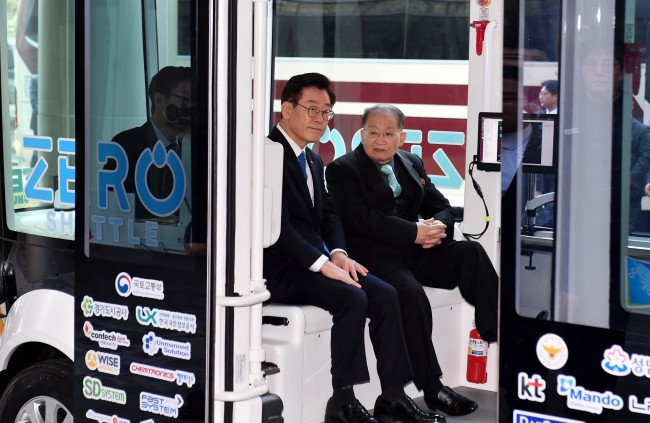Gyeonggi Province’s inter-Korean projects likely to be pushed back to 2019
By Jung Min-kyungPublished : Nov. 21, 2018 - 16:30
Most of Gyeonggi Province’s planned inter-Korean projects failed to materialize this year and are likely to be pushed back to next year.
In late 2017, Gyeonggi allocated 5.5 billion won ($4.9 million) for inter-Korean cooperation projects, but so far only 1.8 billion won has been spent, according to Gyeonggi Province on Wednesday.
In keeping with the mood of detente that arrived on the Korean Peninsula after the inter-Korean summit held in April at the truce village of Panmunjom, Gyeonggi Province has been steadily unveiling plans for cross-border projects. The most recent and most attention-grabbing project was the opening of a South Korean branch of Pyongyang’s famous restaurant Okryugwan, an idea that was raised when Gyeonggi Province Vice Governor for Peace Lee Hwa-young visited the North in October.
In late 2017, Gyeonggi allocated 5.5 billion won ($4.9 million) for inter-Korean cooperation projects, but so far only 1.8 billion won has been spent, according to Gyeonggi Province on Wednesday.
In keeping with the mood of detente that arrived on the Korean Peninsula after the inter-Korean summit held in April at the truce village of Panmunjom, Gyeonggi Province has been steadily unveiling plans for cross-border projects. The most recent and most attention-grabbing project was the opening of a South Korean branch of Pyongyang’s famous restaurant Okryugwan, an idea that was raised when Gyeonggi Province Vice Governor for Peace Lee Hwa-young visited the North in October.

Lee, who talked to North Korean officials at an event celebrating the 11th anniversary of the 2007 inter-Korean summit, said they had agreed to cooperate on the project.
It has been revealed that of the 5.5 billion won earmarked for inter-Korean cooperation projects, the 1.8 billion won that was spent went mostly to local projects, such as assistance for North Korean defectors in South Korea and education on unification, according to Gyeonggi Province. Nearly 200 million won was used for co-sponsorship of last week’s international peace forum with the Asia-Pacific Exchange Association, which five North Korean officials attended. A portion of it is believed to have been used to welcome guests and for the officials’ accommodations.
During their visit, the North’s delegation, led by Ri Jong-hyok, vice chairman of the Korean Asia-Pacific Peace Committee, visited the Second Techno Valley in Pangyo, a hub of technology companies and startups in Gyeonggi Province, and the Gyeonggi-do Agricultural Research & Extension Services in Hwaseong, 60 kilometers south of Seoul. They also had lunch with Lee Jae-myung, governor of Gyeonggi Province, and dinner with Lee Hae-chan, chairman of the ruling Democratic Party.
The financial report was released amid speculation of a rift between the US and South Korea on North Korean issues.
On a national scale, key projects such as the modernization of cross-border railways and roads have also failed to materialize over US concerns about their potential impact on sanctions against Pyongyang. The Koreas had initially planned to begin a field survey on a cross-border railway running along the western part of the peninsula, also known as the Gyeongui Line, in late October so that they could hold a groundbreaking ceremony either in late November or early December.
Reflecting Washington’s concerns, US Secretary of State Mike Pompeo stressed Tuesday that denuclearization and inter-Korean economic cooperation should proceed in tandem, adding that the allies are in “complete agreement” on the matter.
“We have made clear to the Republic of Korea that we do want to make sure that peace on the peninsula and the denuclearization of North Korea aren’t lagging behind the increase in the amount of inter-relationship between the two Koreas,” Pompeo said at a press conference. “We view them as tandem, as moving forward together. We view them as important parallel processes,” he added, his blunt remarks further fueling skepticism surrounding the inter-Korean projects.
Meanwhile, Lee Do-hoon, Seoul’s chief nuclear envoy, who co-chaired the inaugural working group meeting, told reporters after the meeting that the US had expressed its “strong support for the joint study of the inter-Korean railway project.” His counterpart was the US Special Representative for North Korea Stephen Biegun.
Other Gyeonggi Province plans include providing medical assistance to address tuberculosis in the North, along with dental care for children and treatment for parasite infections.
It also seeks to revive projects that were halted due to heightening border tensions in recent years, such as joint efforts to counter malaria and promote reforestation of the North’s woodlands.
Gyeonggi Province has been one of the most active seekers of inter-Korean projects for years. It allocated 5 billion for that purpose in 2016, but also failed to actively invest in the projects lined up for 2017, amid North Korea’s relentless missile and nuclear tests coupled with increasing border tensions on the peninsula. It used 2.1 billion won for inter-Korean cooperation projects in 2017.
By Jung Min-kyung (mkjung@heraldcorp.com)








![[Graphic News] More Koreans say they plan long-distance trips this year](http://res.heraldm.com/phpwas/restmb_idxmake.php?idx=644&simg=/content/image/2024/04/17/20240417050828_0.gif&u=)
![[KH Explains] Hyundai's full hybrid edge to pay off amid slow transition to pure EVs](http://res.heraldm.com/phpwas/restmb_idxmake.php?idx=644&simg=/content/image/2024/04/18/20240418050645_0.jpg&u=20240419100350)






![[From the Scene] Monks, Buddhists hail return of remains of Buddhas](http://res.heraldm.com/phpwas/restmb_idxmake.php?idx=652&simg=/content/image/2024/04/19/20240419050617_0.jpg&u=20240419175937)

![[KH Explains] Hyundai's full hybrid edge to pay off amid slow transition to pure EVs](http://res.heraldm.com/phpwas/restmb_idxmake.php?idx=652&simg=/content/image/2024/04/18/20240418050645_0.jpg&u=20240419100350)

![[Today’s K-pop] Illit drops debut single remix](http://res.heraldm.com/phpwas/restmb_idxmake.php?idx=642&simg=/content/image/2024/04/19/20240419050612_0.jpg&u=)